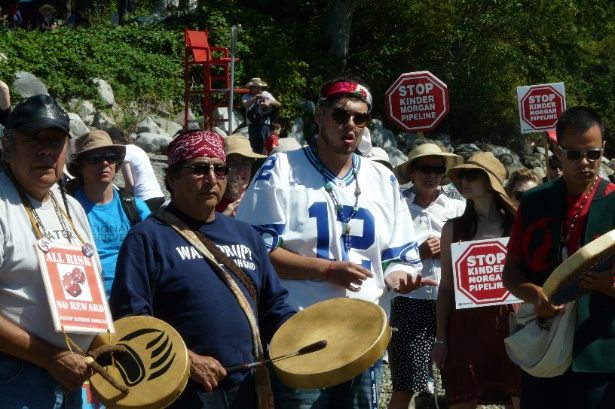
by Nick Engelfried, Waging Nonviolence
For thousands of years, Whey-Ah-Whichen has been a site of importance to the Tsleil-Waututh people. This hospitable flat peninsula in the Pacific Northwest was home to one of their major villages, standing in the shadow of surrounding hills and mountains covered in towering Douglas fir and other ancient trees. Today, Whey-Ah-Whichen is the site of Cates Park, so-named by the descendants of English colonists in what is now British Columbia. It overlooks Burrard Inlet, a finger-like extension of the Salish Sea separating the cities of Vancouver and North Vancouver. The Tsleil-Waututh still live nearby, many of them on a reserve just down the highway.
On July 14, Tsleil-Waututh community leaders brought together several hundred people for a rally on the site of the former village. Many carried signs with messages including “Water is Life,” “Stop Kinder Morgan Pipeline,” and “Protect the Water, Land, Climate.” They came to participate in a fight against one of the largest proposed fossil fuel infrastructure projects in Canada, an expansion of the Trans Mountain pipeline that would transport tar sands oil from Alberta to a Kinder Morgan-owned storage facility directly across the inlet from Whey-Ah-Whichen. There, oil from the pipeline would be loaded into tankers for transport to the United States or across the Pacific.
The rally was only the latest manifestation of the indigenous-led resistance to the Trans Mountain project, which has grown in size and boldness this year. As more and more people arrived at the park, some prepared to take to the water in kayaks, canoes and other small vessels. Hundreds of others massed near the shoreline, watching as the boats headed across the inlet and gathered in front of the razor-wire fence erected by Kinder Morgan to keep people away from its facility. From one of the canoes, Tsleil-Waututh elder Amy George led a water ceremony expressing participants’ intent to care for and protect the inlet.
Continue ReadingFIRST NATIONS RESIST B.C. PIPELINE PLANS


